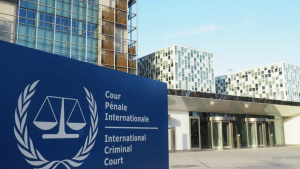By: Remy Kane
Impunity Watch News Staff Writer
THE HAGUE, The Netherlands – On March 19, the International Criminal Court (ICC) Office of the Prosecutor announced that a new Policy on Slavery Crimes is in the works. The policy will mark the first specific action taken by an international judicial institution to combat crimes of slavery. This reflects the ICC’s dedication to achieving justice for victims of such crimes and preventing the future commission of them.
 |
Modern slavery encompasses sex trafficking, forced labor, bonded labor or debt bondage, domestic servitude, and the unlawful recruitment and use of child soldiers. To quote Prosecutor Khan, “Slavery crimes are committed against an untold number of persons and populations, including child soldiers, persons forced to migrate or be trafficked, and persons detained, disappeared, or forced into marriage or labor that devolves into slavery.”
As of 2021, 49.6 million people were living in modern slavery per the International Labour Organization. Of those individuals, 27.6 million were subject to forced labor and 22 million were in forced marriages. Twelve percent of those in forced labor were children and more than half of these children were victims of commercial sexual exploitation. Child trafficking occurs in every country in the world and makes up a third of all human trafficking cases. Human trafficking and forced labor generate roughly $150 billion annually. These numbers are testimony to how slavery crimes are a grave and pressing issue.
The Policy on Slave Crimes will aim to take a survivor-centered, trauma-informed and gender-competent approach, and will be “rigorously implemented” once formulated, according to the Prosecutor. It will be in alignment with other recent policies tackling similar issues, including the 2022 Policy Paper on Gender Persecution, the 2023 Policy on Gender-Based Crimes, and the 2023 Policy on Children.
The Office of the Prosecutor has consulted survivor communities, civil society organizations, national authorities, international organizations, and other justice actors to help shape the Policy. To further aid in the process, the Office is also seeking input from the public. External experts are welcome to offer substantive comment on how the Policy can be best effectuated. Such comments will be accepted via email until April 30, 2024 (see more information about submissions on the ICC website, linked below).
For further information, please see:
ICC – Policy on Children – Dec 7, 2023
ICC – Policy on Gender-Based Crimes – Dec. 4, 2023
ICC – Policy on The Crime of Gender Persecution – Dec 7, 2022
Lexology – ICC Opens Consultation for New Policy in Slavery Crimes – Mar. 20, 2024
UNICEF – UNICEF and The Fight Against Child Trafficking – Nov. 9, 2022